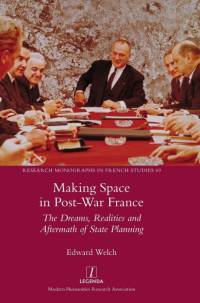Om Making Space in Post-War France
The decades after World War II saw France's look, feel and lived realities transformed by spatial planning and modernization. Aménagement du territoire was a technical and administrative project, but was also political, moral and philosophical, as well as creative and imaginative. It was driven by a powerful obsession with the future and a belief that spatial planning could create the future in the present. During the presidency of Charles de Gaulle (1958-69), it became a vehicle for reasserting France's place in the world after decolonization and expressing its grandeur as an advanced civilization.
In Making Space in Post-war France, Edward Welch tracks the conceptual, ideological and discursive foundations of aménagement, mining an array of material from legislative texts to publicity brochures to investigate how visions of the future were articulated and inscribed on the ground as new towns, infrastructure and other expressions of modernity. He ranges across work by writers, filmmakers and photographers to explore how modernized landscapes and their effect on lived experience begin to permeate French culture during the 1970s and 80s, and how the legacies of spatial planning are negotiated politically, socially and culturally from the 1990s into the new millennium as the French state wrestles with the different pressures affecting its territory.
Edward Welch is Carnegie Professor of French at the University of Aberdeen.
Visa mer

